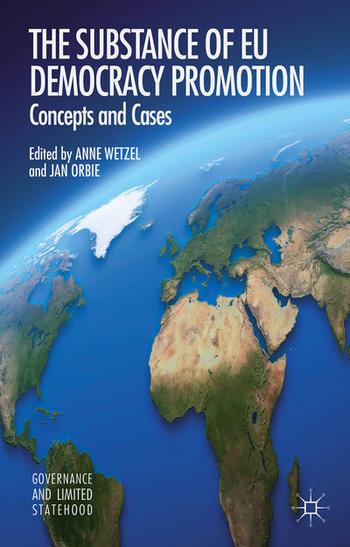The Substance of EU Democracy Promotion: Concepts and Cases
Anne Wetzel, Jan Orbie – 2015
This book provides a comprehensive overview and explanation of the substance of the European Union's (EU) democracy promotion policy. With the promotion of democracy becoming an increasingly important element of European Union foreign policy, the contributors argue that the question of what is actually being promoted by the EU in third countries must come to the fore of academic and practical discussions. Dealing with the democratic agenda promoted by the EU, this collection focuses on elections, civil and political rights, horizontal accountability, effective power to govern, stateness, state administrative capacity, civil society, and socio-economic development as components of embedded liberal democracy. The conceptual part of the book includes an analytical framework and critical discussions from law, political economy, critical social theory and governance perspectives. The empirical part contains 11 chapters where the common analytical framework is applied to 22 country cases.
1. The Substance of EU Democracy Promotion: Introduction and Conceptual Framework; Anne Wetzel
PART I: ALTERNATIVE REFLECTIONS ON THE EU AS A LIBERAL DEMOCRACY PROMOTER
2. Law Perspective: Praise Undeserved? The EU as a Democracy Promoter: A Skeptical Account; Dimitry Kochenov
3. Political Economy Perspective: Fuzzy Liberalism and EU Democracy Promotion: Why Concepts Matter; Milja Kurki
4. Critical Social Theory Perspective: Embeddedness as Substance: The EU's Socialized Approach to Democratization; Jessica Schmidt
5. Governance Perspective: Democratic Governance Promotion through Functional Cooperation; Anne Wetzel
PART II: COUNTRY CHAPTERS
6. Addressing the Remnants of a Communist Past through Accession: Slovakia and the Czech Republic; Eline De Ridder
7. Different Trajectories yet the Same Substance: Croatia and Turkey; Canan Balkır and Müge Aknur
8. Promoting Democracy in Post-Conflict Societies: Bosnia and Herzegovina and Kosovo; Labinot Greiçevci and Bekim Çollaku
9. Power Relations Meet Domestic Structures: Russia and Ukraine; Susan Stewart
10. Neither Integrated Nor Comprehensive in Substance: Armenia and Georgia; Hrant Kostanyan
11. Democracy through the Invisible Hand? Egypt and Tunisia; Vicky Reynaert
12. When Security Trumps Democracy: Israel and Palestine; Benedetta Voltolini and Federica Bicchi
13. Favouring Leaders over Laggards: Kazakhstan and Kyrgyzstan; Fabienne Bossuyt and Paul Kubicek
14. Democracy Promotion in Restrictive Environments: Ethiopia and Eritrea; Karen Del Biondo
15. Responding to Political Crises in the South Pacific: The Solomon Islands and Fiji; Maurizio Carbone and Karen Del Biondo
16. Much Ado about Nothing? Brazil and Venezuela; Andrea Ribeiro Hoffmann
PART III: CONCLUSIONS
17. Conclusions; Anne Wetzel and Jan Orbie

